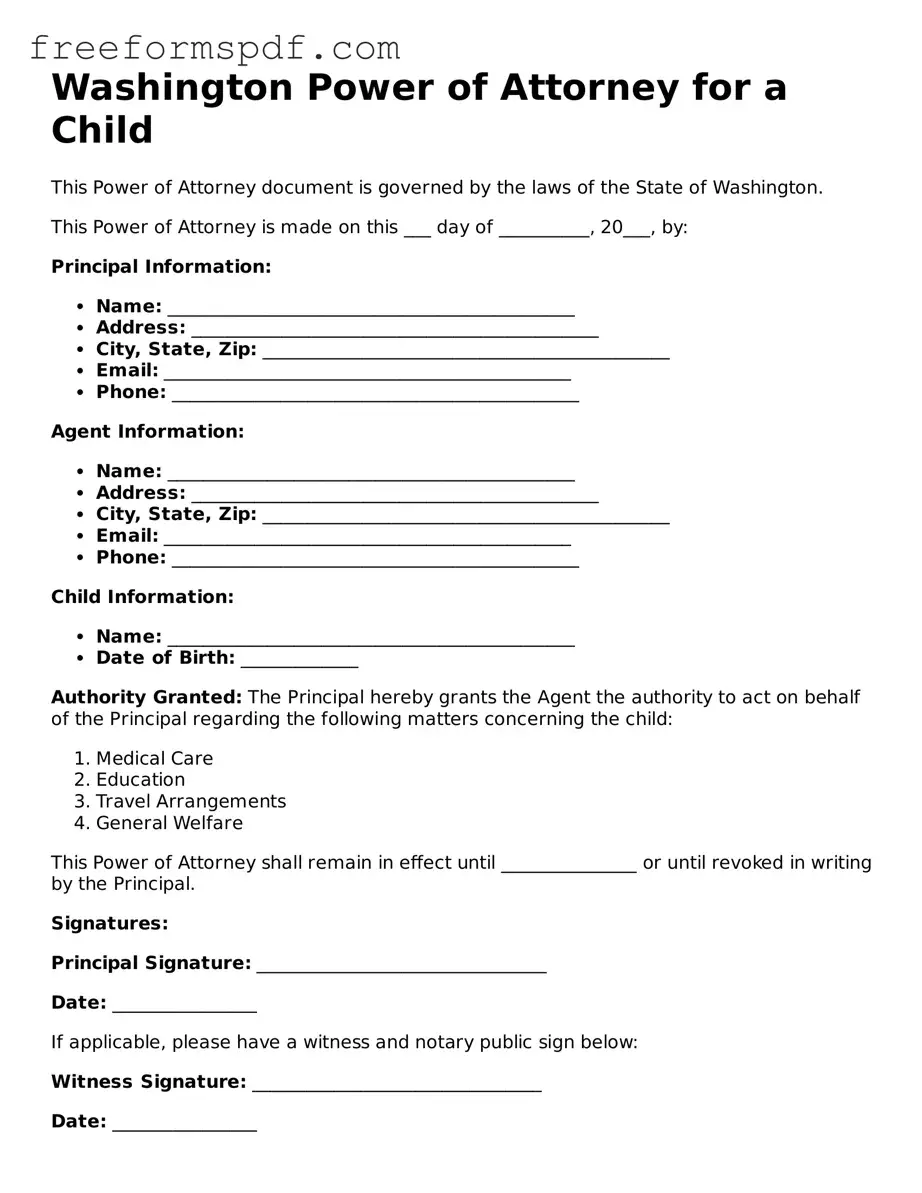Attorney-Verified Power of Attorney for a Child Document for Washington State
Common mistakes
-
Not Specifying the Duration of Authority: One common mistake is failing to clearly state how long the power of attorney will be in effect. Without a specified duration, the authority granted may be unclear, leading to potential disputes or misunderstandings.
-
Omitting Necessary Signatures: The form requires signatures from both the parent or guardian and the designated agent. Neglecting to obtain all required signatures can render the document invalid, which may create complications when the agent tries to act on behalf of the child.
-
Using Incomplete or Incorrect Information: Providing incomplete or incorrect information about the child or the agent can lead to issues. This includes not accurately listing the agent’s contact details or failing to include the child's full legal name.
-
Not Understanding the Scope of Authority: Many individuals do not fully comprehend what powers they are granting. It is important to understand whether the agent has full authority or limited powers, as this can affect decision-making and responsibilities.
Learn More on This Form
-
What is a Power of Attorney for a Child in Washington?
A Power of Attorney for a Child in Washington allows a parent or legal guardian to grant another adult the authority to make decisions on behalf of their child. This can include decisions about medical care, education, and general welfare. It is particularly useful for temporary situations, such as when a parent is traveling or unable to care for the child.
-
Who can be designated as an agent?
Any adult can be designated as an agent in the Power of Attorney for a Child form. This can include relatives, friends, or trusted neighbors. It’s important to choose someone responsible and capable of making decisions in the child’s best interest.
-
How long does the Power of Attorney remain in effect?
The Power of Attorney for a Child typically remains in effect until the specified end date, if one is provided, or until the parent or guardian revokes it. If no end date is specified, it may be valid until the child reaches the age of 18. However, it’s advisable to periodically review and update the document as circumstances change.
-
Do I need to have the form notarized?
Yes, in Washington, the Power of Attorney for a Child form must be signed in the presence of a notary public. This step adds an extra layer of validity and ensures that the document is legally recognized.
-
Can I revoke the Power of Attorney once it is in effect?
Yes, a parent or legal guardian can revoke the Power of Attorney at any time. To do so, it is recommended to provide written notice to the designated agent and any relevant parties, such as schools or healthcare providers. A revocation form can be used to formalize this process.
-
What happens if the designated agent cannot fulfill their duties?
If the designated agent is unable to fulfill their duties, the Power of Attorney may still be valid unless revoked. It’s wise to designate an alternate agent in the form, ensuring that there is always someone available to make decisions for the child if needed.
Misconceptions
Understanding the Washington Power of Attorney for a Child form is essential for parents and guardians. However, several misconceptions can lead to confusion. Here are seven common misconceptions:
- It can only be used in emergencies. Many believe this form is only applicable during emergencies. In reality, it can be used for various situations, such as travel or temporary guardianship.
- It requires a lawyer to complete. While legal advice can be helpful, it is not mandatory to have a lawyer fill out the form. Parents can complete it themselves as long as they understand the requirements.
- It is permanent. Some think that once the Power of Attorney is established, it lasts indefinitely. In fact, it can be revoked or modified at any time by the parent or guardian.
- It gives away parental rights. A common misconception is that signing this form relinquishes parental rights. The Power of Attorney allows for temporary authority but does not transfer legal custody.
- It can be used for any child. Many assume this form can be used for any child. However, it specifically applies to the child or children named in the document.
- It is only valid in Washington State. While the form is created under Washington law, it may be recognized in other states. However, it is advisable to check local laws for validity.
- It is difficult to revoke. Some believe that revoking a Power of Attorney is a complicated process. In reality, revocation can be done easily by notifying the designated agent and providing a written notice.
Being aware of these misconceptions can help parents and guardians make informed decisions regarding the care of their children.
Some Other Power of Attorney for a Child State Templates
Durable Power of Attorney Oregon - It ensures that someone has the authority to make necessary decisions for the child while the parent is unavailable.
To streamline the reporting process and ensure adherence to regulations, contractors may find it beneficial to use resources such as the NY Templates, which provide tailored templates for the NYC Payroll Form. This helps in accurately documenting weekly payroll information required when working on public projects, making compliance with labor laws more manageable.
How to Become Power of Attorney for Parent - Allows a designated person to enroll the child in school or extracurricular activities.
Does a Power of Attorney Need to Be Recorded in Pennsylvania - Can cover decisions related to healthcare, schooling, and welfare.
